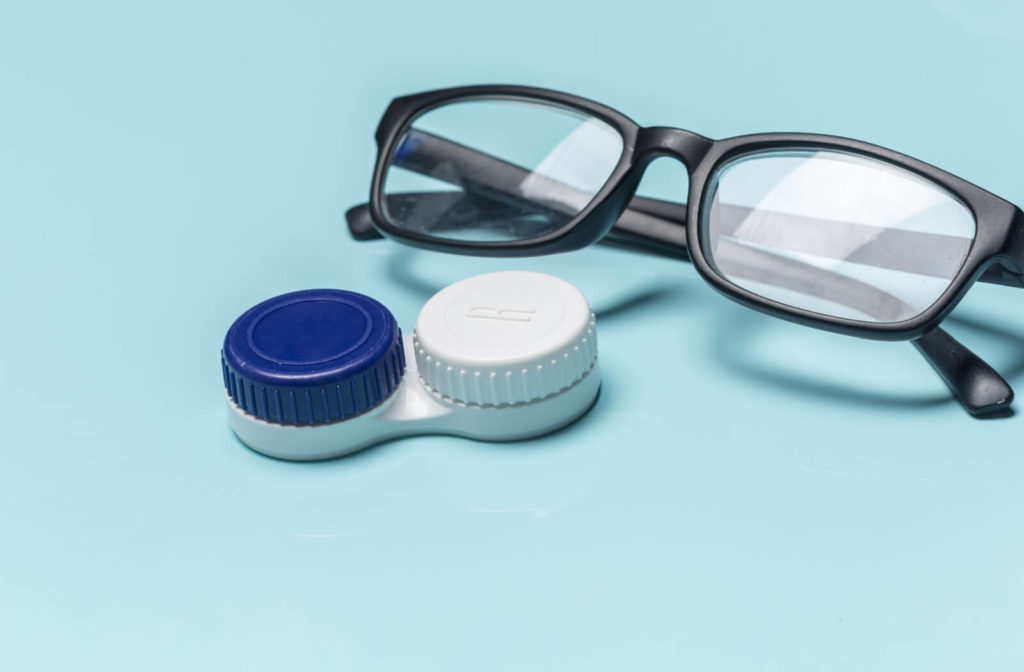Contact lenses and glasses are both popular options for correcting vision problems, but each has its own pros and cons. Your optometrist can help you decide which option is best for you, but the choice will eventually come down to your own needs and preferences. Many people keep a pair of glasses around for backup if they wear contact lenses, and some people only wear contacts on certain occasions.
Once you decide what vision correction option you want, you can get a feel for wearing glasses or contacts and still have the opportunity to explore the alternative in the future. Keep in mind that contact lenses need to be fitted to your eye and typically require a different prescription than your eyeglasses.
Contact Lenses
Contact lenses come in a few different types but are generally small, thin disks worn directly on the eye’s surface. They’re a popular option for people who want to correct their vision without having to wear glasses, with about 45 million Americans wearing contact lenses regularly.
Contact lenses offer several advantages over glasses, including:
- Greater freedom of movement: Contact lenses do not have frames that can get in the way or get knocked off, giving you greater freedom of movement. This makes them ideal for sports and other physical activities.
- Better peripheral vision: Contact lenses don’t block your peripheral vision. Since they sit on the surface of your eye, they can produce a more “natural” feeling field of vision.
- Unhindered appearance: Contact lenses are virtually invisible when worn, so they won’t affect your appearance the way that glasses can. They’re especially popular among people who are self-conscious about wearing glasses or don’t want to worry about their vision correction clashing with outfits or hairstyles.
Despite these benefits, contact lenses also have some downsides to consider. These include:
- Risk of infection: Contact lenses can increase your risk of eye infections, particularly if you don’t properly care for them. It’s essential to follow the instructions for cleaning and disinfecting your contact lenses to reduce the risk of infection.
- Dry eyes: Wearing contact lenses can sometimes cause dry eyes, especially if you wear them for long periods of time. In this case, you might need to wear specific lenses that won’t dry out your eye.
- Cost: Contact lenses can be more expensive in the long run than glasses, particularly if you wear disposable lenses that need to be replaced frequently.
- Incompatible with certain eye conditions: While many options exist for people with “hard-to-fit” eyes, high amounts of astigmatism could be more challenging to correct with contact lenses. This difficult fit can be the same for people with an irregular cornea or a rare allergy to the materials that make up contact lenses or contact lens solutions.
Prescription Glasses
Glasses come in various shapes and styles and can correct most vision problems. Glasses offer a number of advantages over contact lenses, including:
- Low maintenance: Glasses don’t require the same level of care and maintenance as contact lenses. You simply need to clean them occasionally and take them to the optometrist for adjustments as needed.
- Long-term cost: Glasses can be more cost-effective in the long run than contact lenses, particularly if you need to replace your contact lenses frequently.
- Convenience: Glasses are easy to put on and take off, which can be convenient if you need to take them off frequently during the day.
- Lower risk of infection: Wearing glasses eliminates the risk of eye infections associated with contact lenses.
Much like contact lenses, glasses also have some downsides. These include:
- Limited peripheral vision: Glasses can block your peripheral vision, which can be especially problematic for people who need a full range of vision for work or play.
- Can affect appearance: Glasses are visible on the face and will affect your appearance. Some people enjoy the look glasses can give them, but they’re not for everyone and can make some people feel uncomfortable.
- Can be inconvenient during physical activities: Glasses can be knocked off or get in the way during sports and other physical activities.
- Can be affected by weather conditions: Glasses can fog up in humid or cold weather, which can be a problem for active outdoor people.

Choosing Which Is Right For You
Choosing contact lenses and glasses will ultimately depend on your individual needs and preferences. For example, if you’re someone who is self-conscious about wearing glasses and wants greater freedom of movement, contact lenses may be the right choice for you. However, if you prefer a low-maintenance option and don’t mind glasses affecting your appearance, glasses may be the better choice.
It’s also important to note that one option may better suit some people based on their specific vision problem. For example, people with chronic dry eyes may find contact lenses uncomfortable, while people with very strong prescriptions may find glasses give them clearer vision.
Getting an Expert Opinion
It’s recommended to consult with your eye doctor to understand which option could be the best for you and your vision needs. Everyone’s situation is unique, and your choice for vision correction is as much about your lifestyle as it is about your eyes.
Total Vision Del Mar can help you make an informed decision about the best vision correction option for you. If you’re looking for a way to see clearly but still don’t know which option would work best for your lifestyle and needs, schedule an appointment with our knowledgeable team today!



